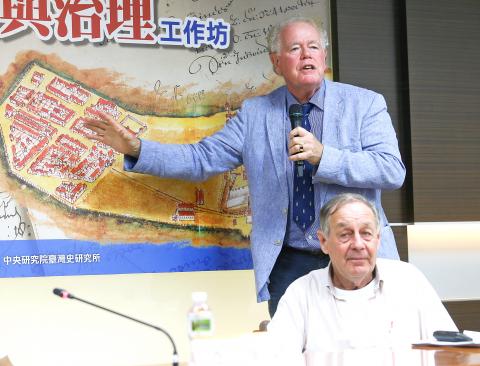Researchers yesterday said they have discovered a trove of documents detailing street plans of mid-17th century Tainan under Dutch rule, highlighting the city’s role as a commercial hub inhabited by migrants from across Southeast Asia.
The nation’s oldest city, Tainan was founded nearly 400 years ago when urban settlements gathered around two Dutch strongholds — Fort Zeelandia, also known as Anping Fort (安平古堡), and Fort Provintia, also known as the Chihkan Tower (赤崁樓), Academia Sinica’s Institute of Taiwan History said in a press release.
Studies about Taiwan during the Dutch colonial era mainly come from the East India Co’s records, but the latest discovery could shed some light on the period’s history from a civilian perspective, Menno Leenstra, a researcher at the Netherlands-based Centre for International Heritage Activities, told a news conference at the institute.

Photo: CNA
The trove consists of about 35 documents originally owned by an East India Co employee named Nicasius de Hooghe, who was tasked with measuring Zeelandia’s streets from 1643 to 1647 until he left Taiwan, Leenstra said.
On the way back to his home in Amsterdam, De Hooghe, along with his wife and one of his two sons, died in an accident.
His surviving son was placed under the guardianship of his uncle, Romeyn de Hooghe, and notary Sebastiaan van der Piet, Leenstra said.
While searching the family archives preserved by the notary about three years ago, Leenstra said he discovered accounts about the De Hooghe family’s stay in Taiwan and an inventory of the lost city plan.
The discovery was unexpected because he had been conducting studies about dodos, an extinct bird, to gather information about Asian shipping activities in that era, he added.
Judging from the documents, some of the most prominent Chinese merchants in Zeelandia did not migrate directly from China’s coastal provinces, but from various places in Southeast Asia, institute assistant research fellow Cheng Wei-chung (鄭維中) said.
Hoklo was the main language of the Chinese inhabitants, but many could also speak Malaysian or Japanese, Cheng said, adding that Portuguese and Spanish were also common among Dutch migrants.
Due to limited sources, a majority of Taiwan’s architectural studies start from the 18th century, during the Qing Dynasty, but the newly found documents can help historians reconstruct buildings as early as the 17th century, said Huang En-yu (黃恩宇), an assistant professor at National Cheng Kung University’s Department of Architecture.

Beijing could eventually see a full amphibious invasion of Taiwan as the only "prudent" way to bring about unification, the US Department of Defense said in a newly released annual report to Congress. The Pentagon's "Annual Report to Congress: Military and Security Developments Involving the People's Republic of China 2025," was in many ways similar to last year’s report but reorganized the analysis of the options China has to take over Taiwan. Generally, according to the report, Chinese leaders view the People's Liberation Army's (PLA) capabilities for a Taiwan campaign as improving, but they remain uncertain about its readiness to successfully seize

Taiwan is getting a day off on Christmas for the first time in 25 years. The change comes after opposition parties passed a law earlier this year to add or restore five public holidays, including Constitution Day, which falls on today, Dec. 25. The day marks the 1947 adoption of the constitution of the Republic of China, as the government in Taipei is formally known. Back then the Chinese Nationalist Party (KMT) governed China from Nanjing. When the KMT, now an opposition party in Taiwan, passed the legislation on holidays, it said that they would help “commemorate the history of national development.” That

HORROR STORIES: One victim recounted not realizing they had been stabbed and seeing people bleeding, while another recalled breaking down in tears after fleeing A man on Friday died after he tried to fight the knife-wielding suspect who went on a stabbing spree near two of Taipei’s busiest metro stations, Taipei Mayor Chiang Wan-an (蔣萬安) said. The 57-year-old man, identified by his family name, Yu (余), encountered the suspect at Exit M7 of Taipei Main Station and immediately tried to stop him, but was fatally wounded and later died, Chiang said, calling the incident “heartbreaking.” Yu’s family would receive at least NT$5 million (US$158,584) in compensation through the Taipei Rapid Transit Corp’s (TRTC) insurance coverage, he said after convening an emergency security response meeting yesterday morning. National

Taiwan has overtaken South Korea this year in per capita income for the first time in 23 years, IMF data showed. Per capita income is a nation’s GDP divided by the total population, used to compare average wealth levels across countries. Taiwan also beat Japan this year on per capita income, after surpassing it for the first time last year, US magazine Newsweek reported yesterday. Across Asia, Taiwan ranked fourth for per capita income at US$37,827 this year due to sustained economic growth, the report said. In the top three spots were Singapore, Macau and Hong Kong, it said. South